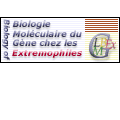
|
|















|
International Summer School
From Genome to Life:
Structural, Functional and Evolutionary approaches
|
COLLIER
Justine |
|
CEA-Grenoble, DBMS/BECP, 17, Rue des Martyrs, Grenoble 38054, France title: Trans-translation of endogenous proteins in Escherichia coli
Trans-translation is a co-translational tagging mechanism mediated by the tmRNA (SsrA)/SmpB system that modifies proteins during their synthesis by addition of a hydrophobic sequence; the resulting fusion proteins are then degraded. We purified endogenous trans-translated proteins by means of a genetically engineered tmRNA that expresses a poly-histidine sequence, and identified them by mass spectrometry. Analysis of the tagged proteins suggested that they are tagged at their C-terminal extremity. A change from a weak to strong translational stop sequence (UGAc to UAAu) annihilated trans-translation of an identified substrate. Termination by UGA recruits the translational release factor (RF) 2. RF2 deficiency stimulated trans-translation while an increase in its activity had the opposite effect, revealing a dynamic competition between translational termination and trans-translation. Poorly efficient stop codons can lead to the formation of accidental recoding products. We propose that one function of trans-translation is to prevent accidental recoding at inefficient termination sites, thereby avoiding the formation of extended proteins.
Ref.: Collier J, Binet E. and Bouloc P. (2002) Competition between SsrA tagging and translational termination at weak stop codons in Escherichia coli. Molecular Microbiology 45(3), 745-754: available under request at Justine.Collier@igmors.u-psud.fr. |